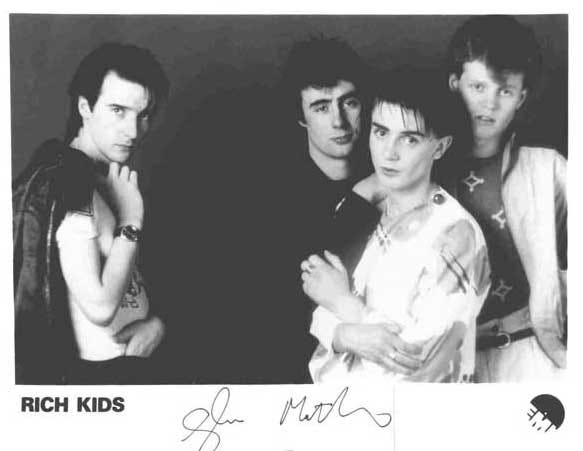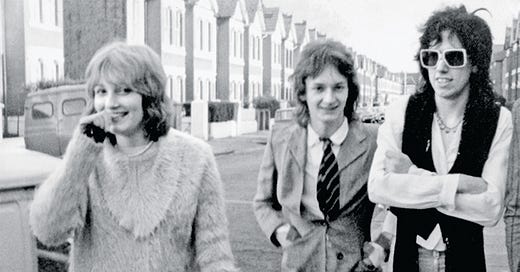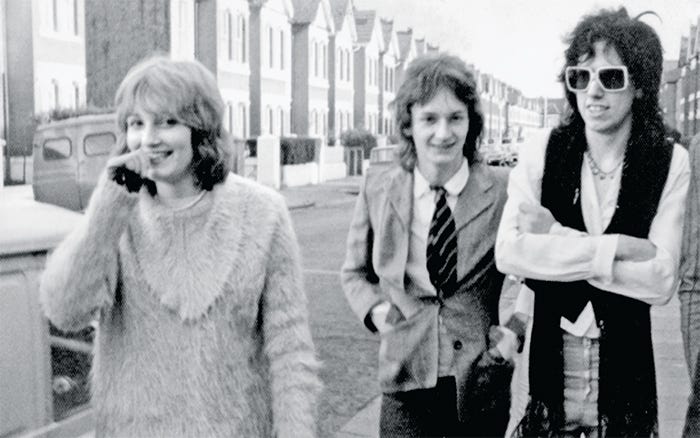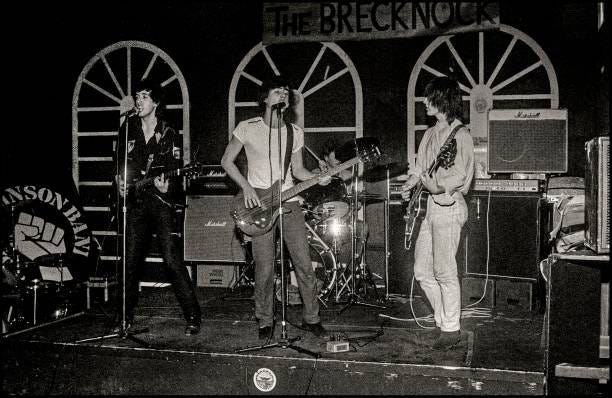Mick Jones... the Sex Pistol?
Once upon a time in London, Mick Jones almost joined the Sex Pistols.
In September of 1975, the Sex Pistols put an ad into the ‘Musicians Wanted’ section of Melody Maker, a popular British music magazine, asking for a whizz kid guitarist no worse looking than Johnny Thunders to audition for the band.

The fledgling group, who still only had one gig under their belt, were in a bit of a bind. Steve Jones, who’d been removed from vocal duties earlier in the year, was still learning how to play the guitar and Paul Cook, the drummer, was threatening to quit if Jones’ playing didn’t improve.
Perhaps as a ploy to scare Jones into becoming a better musician, manager Malcolm McLaren decided that the only solution to this problem was to look for a second guitarist. So, much to the annoyance of Jones, the band began to vet potential new members.
One potential new member was none other than Mick Jones, the founder of the Sex Pistols’ sister band and their biggest rival, The Clash.
But in October of 1975, The Clash didn’t exist. Mick Jones was the guitarist (and one of only two settled members) of a barely-existent band called London SS that was under the management of Bernie Rhodes, an associate and artistic collaborator of McLaren’s. Bernie’s goal was to turn London SS into another Sex Pistols. Mick’s goal was to become a glam rock guitar god like Johnny Thunders.
Despite having a manager and a pre-Generation X Tony James on bass, things were going nowhere fast for London SS. So when Mick saw his beloved Johnny Thunders mentioned in a ‘Musicians Wanted’ advert, he jumped at the chance to meet the mystery band who loved the New York Dolls as much as he did.
The mystery band were, of course, the Sex Pistols.
Mick was everything they were looking for. He played the right instrument, he liked the right music, and he was friends with the right people. If the Sex Pistols were going to have a second guitarist, the obvious choice was standing right in front of them.
But there was one massive, glaring issue.
Mick Jones didn’t look like a Sex Pistol.
“I remember a bunch of guys with hair down their backs. They looked ridiculous. We were all laughing. One of them [Mick], instead of going upstairs, picked up a guitar and started jamming with us and it would have worked except for the hair.”
– Glen Matlock, Sex Pistols bassist, Passion Is a Fashion
With his wide-collared shirt, scarf, and long, bushy hair, Mick was exactly the kind of late 70s rock ‘n’ roll cliche that the Sex Pistols hated. It didn’t matter that Mick knew The Modern Lovers’ ‘Roadrunner’ by heart or that he shopped at Sex and Acme Attractions. At that point in his life, there was nothing punk about Mick Jones on the outside.
Not that Mick cared much about the Sex Pistols' opinions on his fashion sense. To Mick, the Pistols—with their razor blade haircuts and shaved faces—were the hideous ones. They were, as Tony James put it, quite a shock to the young glam rocker.
“We went down to Denmark Street and there were these guys there with really short hair. It was quite a shock. We thought The Dolls were revolutionary because they had long hair. We didn’t realize that short hair could be used as a reaction to the excess of rock ‘n’ roll.”
– Tony James, Passion Is a Fashion
But a conflict of aesthetic interests didn’t stop Mick from playing with members of the Sex Pistols in the future.
In February of 1977, Glen Matlock split with the Sex Pistols for a variety of reasons, chief among them being that he couldn’t stand being Johnny Lydon’s personal on-stage punching bag any longer. Mick saw his chance immediately and phoned Matlock up to ask if he wanted to join The Clash. According to Pat Gilbert’s definitive Clash biography Passion Is a Fashion, this idea was nicked from Rhodes and McLaren, who had wanted to swap their bands’ bass players during the Anarchy In The U.K. Tour back in ‘76.
Matlock declined the offer but let Mick play with his new band, the Rich Kids, as a live session musician.
Mick also played backup for Sid Vicious when, in 1978, Nancy Spungen called him up and asked if he wanted to join Sid onstage for the ex-Pistol’s first set of gigs at Max’s Kansas City. Joe Strummer, who’d always had a soft spot for Vicious, encouraged Mick to take a chance on their old friend.
Unlike with Matlock, playing with heroin addict Sid Vicious was about as fun as it sounds. The friend who had shoplifted tins of beans for Mick back in London was long gone, replaced by a shambling zombie.
“We just about managed about five songs. Five songs for five bucks. It was a nightmare between shows, it was full on. Sid was sort of semi there. It was a serious drug thing. Me and Joe kept looking at each other, because we couldn’t believe it.”
– Mick Jones, Passion Is a Fashion
Luckily for Mick, this would be the last time he’d ever have to deal with Sid Vicious.
But what happened with the Sex Pistols’ hunt for a second guitarist? Surely there’s more to that story?
Curious reader, you’re as lucky as Mick because there is, in fact, more to that story!
In October of 1975, a 15 year old guitarist was chaperoned by their art teacher down to Denmark Street to audition for the Sex Pistols. When told to play, they showed a level of virtuosity that was well beyond their years. Naturally, the Sex Pistols agreed to take on the young guitarist, at the time known as Steve New.
Unfortunately for that virtuoso, known now as Stella Nova (she came out as transgender in the early 2000s), her time as a Sex Pistol lasted only a month. Steve Jones was improving so rapidly that the band realized they didn’t need a second guitarist. Later, she would start the Rich Kids with Glen Matlock and join Johnny Lydon for a short stint in PiL.
Stella might not be Mick Jones, co-writer of London Calling, but I can’t help but wonder how music history might have changed had she stayed with the Sex Pistols.

Sources:
Gilbert, Pat. Passion Is a Fashion: The Real Story of The Clash. Aurum Press Ltd, 2004
Matlock, Glen and Pete Silverton. I Was a Teenage Sex Pistol. Omnibus Press, 1990
Stripe, Adelle. “Clean on the Dirty: An Interview With Steve New.” 3:AM Magazine, www.3ammagazine.com/3am/clean-on-the-dirty-an-interview-with-steve-new






This was great, as someone with with no real knowledge or interest in this area I was engaged and enjoyed reading
Great article!!! So many connections to Mick Jones I had never known about before. Fantastic work and so well written! x